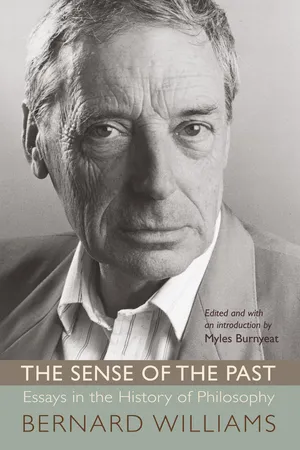
The Sense of the Past
Essays in the History of Philosophy
- 416 pages
- English
- ePUB (mobile friendly)
- Available on iOS & Android
About this book
Before his death in 2003, Bernard Williams planned to publish a collection of historical essays, focusing primarily on the ancient world. This posthumous volume brings together a much wider selection, written over some forty years. His legacy lives on in this masterful work, the first collection ever published of Williams's essays on the history of philosophy. The subjects range from the sixth century B.C. to the twentieth A.D., from Homer to Wittgenstein by way of Socrates, Plato, Aristotle, Descartes, Hume, Sidgwick, Collingwood, and Nietzsche. Often one would be hard put to say which part is history, which philosophy. Both are involved throughout, because this is the history of philosophy written philosophically. Historical exposition goes hand in hand with philosophical scrutiny. Insights into the past counteract blind acceptance of present assumptions.
In his touching and illuminating introduction, Myles Burnyeat writes of these essays: "They show a depth of commitment to the history of philosophy seldom to be found nowadays in a thinker so prominent on the contemporary philosophical scene."
The result celebrates the interest and importance to philosophy today of its near and distant past.
The Sense of the Past is one of three collections of essays by Bernard Williams published by Princeton University Press since his death. In the Beginning Was the Deed: Realism and Moralism in Political Argument, selected, edited, and with an introduction by Geoffrey Hawthorn, and Philosophy as a Humanistic Discipline, selected, edited, and with an introduction by A. W. Moore, make up the trio.
Frequently asked questions
- Essential is ideal for learners and professionals who enjoy exploring a wide range of subjects. Access the Essential Library with 800,000+ trusted titles and best-sellers across business, personal growth, and the humanities. Includes unlimited reading time and Standard Read Aloud voice.
- Complete: Perfect for advanced learners and researchers needing full, unrestricted access. Unlock 1.4M+ books across hundreds of subjects, including academic and specialized titles. The Complete Plan also includes advanced features like Premium Read Aloud and Research Assistant.
Please note we cannot support devices running on iOS 13 and Android 7 or earlier. Learn more about using the app.
Information
Table of contents
- Table of Contents
- Preface Patricia Williams
- Introduction Myles Burnyeat
- ONE The Legacy of Greek Philosophy
- TWO The Women of Trachis: Fictions, Pessimism, Ethics
- THREE Understanding Homer: Literature, History and Ideal Anthropology
- FOUR Pagan Justice and Christian Love
- FIVE Introduction to Platos Theaetetus
- SIX Plato against the Immoralist
- SEVEN The Analogy of City and Soul in Platos Republic
- EIGHT Platos Construction of Intrinsic Goodness
- NINE Cratylus Theory of Names and Its Refutation
- TEN Plato: The Invention of Philosophy
- ARISTOTLE
- ELEVEN Acting as the Virtuous Person Acts
- TWELVE Aristotle on the Good: A Formal Sketch
- THIRTEEN Justice as a Virtue
- FOURTEEN Hylomorphism
- DESCARTES
- FIFTEEN Descartes Use of Scepticism
- SIXTEEN Introductory Essay on Descartes Meditations
- SEVENTEEN Descartes and the Historiography of Philosophy
- HUME
- EIGHTEEN Hume on Religion
- SIDGWICK
- NINETEEN The Point of View of the Universe: Sidgwick and the Ambitions of Ethics
- NIETZSCHE
- TWENTY Nietzsches Minimalist Moral Psychology
- TWENTYߞONE Introduction to The Gay Science
- TWENTYߞTWO ὔThere are many kinds of eyesὕ
- TWENTYߞTHREE Unbearable Suffering
- R. G. COLLINGWOOD
- TWENTYߞFOUR An Essay on Colling wood
- WITTGENSTEIN
- TWENTYߞFIVE Wittgenstein and Idealism
- Bernard Williams: